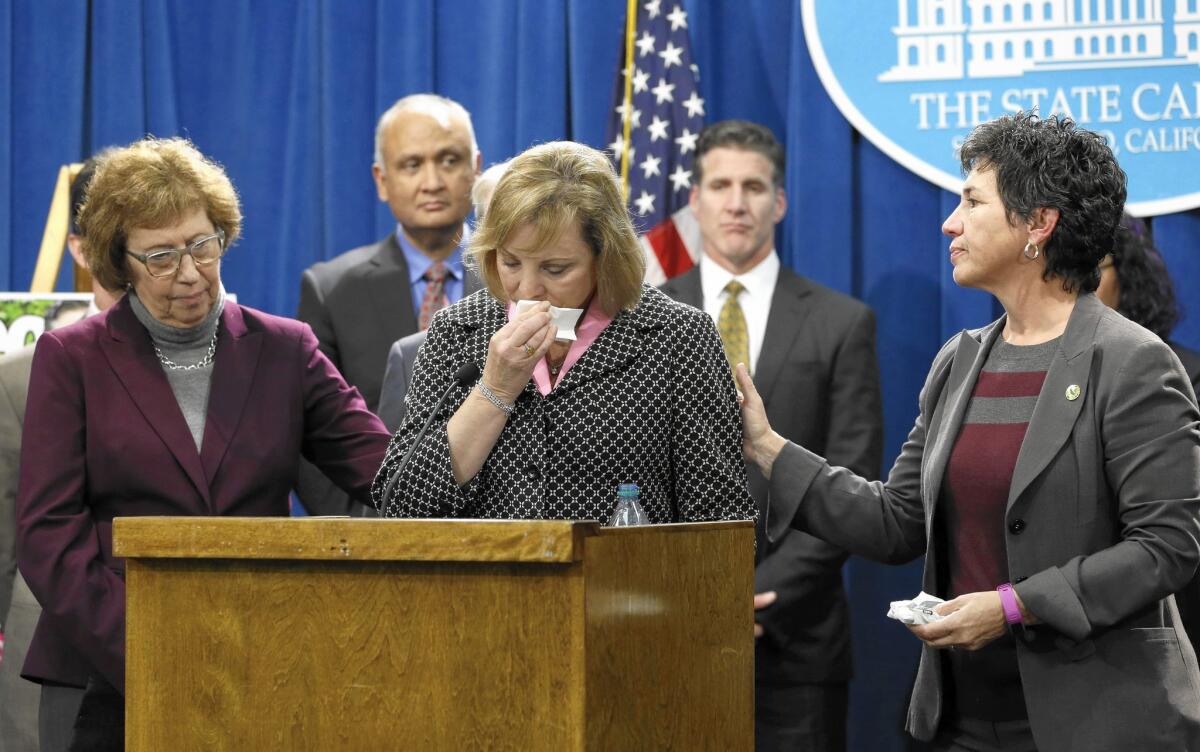California lawmakers will push death-with-dignity measure

- Share via
Reporting from SACRAMENTO — It was a dying wish of Brittany Maynard, after terminal cancer led her to move to Portland so she could legally end her life, that her home state of California would someday adopt Oregon’s death-with-dignity law.
On Wednesday, less than three months after 29-year-old Maynard’s death drew international attention to the issue, her husband and mother stood with nine California lawmakers to announce legislation that would allow physicians in this state to prescribe medications to hasten death for the terminally ill.
“This option is something that Brittany and I thought should be available to all Californians,” her husband, Dan Diaz, said at an emotional Capitol news conference.
“She recognized that to stay in California would mean that she potentially would face a horrific death,” Diaz said. “Brittany was a Californian. We lived in this state and she would have preferred to pass away peacefully in this state.”
Four states besides Oregon — Montana, New Mexico, Vermont and Washington — also allow terminally ill patients to seek medical help to die. Legislation to permit it in California has failed twice, opposed on religious grounds and by many doctors, among others.
With Maynard’s consent, the group Compassion & Choices set up a Brittany Maynard Fund to raise money for a campaign to enact assisted suicide laws across the country. Active efforts are underway in New York, Pennsylvania, Nevada and several other places, according to Patricia A. González-Portillo, a spokeswoman for Compassion & Choices.
If California lawmakers do not adopt such a law, González-Portillo said, the group may take the issue to voters: “We are prepared to go to the ballot in 2016, but we are hoping to make this happen” through legislation.
Maynard moved with Diaz to Oregon from the Bay Area, believing her cancer would cause great suffering before it ended her life, she said in a YouTube video that has had more than 11 million views. On Wednesday, Maynard’s mother, Debbie Ziegler, issued a plea.
“Please help me carry out my daughter’s legacy,” Ziegler said, her eyes welling and voice choking. “Please help me assure that other terminally ill patients don’t face what we had to face.”
Having to leave her California home, family and friends “added another layer of pain” for Maynard, Ziegler said.
California’s new legislation is modeled on Oregon’s, making assisted death available to those 18 or older who are diagnosed with a terminal illness that is expected to result in death within six months, provided they are mentally capable of making healthcare decisions.
The proposal would go further, giving pharmacists and physicians legal immunity in such deaths.
In 1992, California voters rejected a much broader proposal that would have allowed physicians to administer lethal injections to their patients. In 2005 and 2007, narrower bills that would have allowed terminally ill patients to get prescriptions for lethal drug doses to administer themselves failed in the Legislature.
Republicans voted as a bloc against the bills and were joined by enough Democrats to sink the measures.
Opposition also came, and could still come, from religious leaders who consider suicide immoral; from the California Medical Assn., which argues that a doctor’s job is to heal; and from advocates for the disabled, who say the sick could be coerced to end their lives to save medical costs or by heirs with other agendas.
CMA policy, “which has been debated numerous times, is in opposition to physician-assisted suicide because it is fundamentally incompatible with the physician’s role as a healer,” said Molly Weedn, a spokeswoman for the organization.
She added that the group is reviewing the new bill before taking a position.
The Disability Rights Education and Defense Fund is against the measure.
“If this bill passes, some people’s lives will be ended without their consent, through mistakes and abuse,” said Marilyn Golden, a senior policy analyst for the group.
Democratic Sens. Lois Wolk of Davis and Bill Monning of Carmel, the main coauthors of the new “End of Life Option Act,” said its prospects are better than those of previous legislation. More safeguards are proposed, and attitudes are changing, they said.
Diaz went Wednesday to the offices of Republican Assembly members to tell his story and lobby for the bill, SB 128. The lawmakers were noncommittal.
Supporters say the experience in Oregon, where voters approved the assisted death law in 1994, shows that it has provided choice without abuse and that people retain a choice even after a prescription is filled.
In a report published last year, the state said 1,173 people had been prescribed life-ending medication since the program began, but only 752 had died ingesting it. Others chose not to use it or died of other causes, or their status was unknown.
Maynard’s mother recalled the moment when her daughter received word that she would get the prescription she sought to end her own life.
“Her beautiful face softened; there was a peacefulness in her gaze,” Ziegler said, breaking down in tears.
Maynard’s last message, posted on Facebook, indicated that she did not regret her decision.
“Goodbye to all my dear friends and family that I love,” the post says. “Today is the day I have chosen to pass away with dignity in the face of my terminal illness, this terrible brain cancer that has taken so much from me … but would have taken so much more.”
patrick.mcgreevy@latimes.com
Twitter: @mcgreevy99
More to Read
Sign up for Essential California
The most important California stories and recommendations in your inbox every morning.
You may occasionally receive promotional content from the Los Angeles Times.














